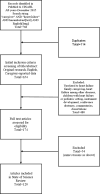Family caregiving for persons with heart failure at the intersection of heart failure and palliative care: a state-of-the-science review
- PMID: 28160116
- PMCID: PMC5544594
- DOI: 10.1007/s10741-017-9597-4
Family caregiving for persons with heart failure at the intersection of heart failure and palliative care: a state-of-the-science review
Abstract
Many of the 23 million individuals with heart failure (HF) worldwide receive daily, unpaid support from a family member or friend. Although HF and palliative care practice guidelines stipulate that support be provided to family caregivers, the evidence base to guide care for this population has not been comprehensively assessed. In order to appraise the state-of-the-science of HF family caregiving and recommend areas for future research, the aims of this review were to summarize (1) how caregivers influence patients, (2) the consequences of HF for caregivers, and (3) interventions directed at HF caregivers. We reviewed all literature to December 2015 in PubMed and CINAHL using the search terms "heart failure" AND "caregiver." Inclusion criteria dictated that studies report original research of HF family caregiving. Articles focused on children or instrument development or aggregated HF with other illnesses were excluded. We identified 120 studies, representing 5700 caregivers. Research on this population indicates that (1) caregiving situations vary widely with equally wide-ranging tasks for patients to help facilitate their health behaviors, psychological health and relationships, and quality of life (QoL); (2) caregivers have numerous unmet needs that fluctuate with patients' unpredictable medical status, are felt to be ignored by the formal healthcare system, and can lead to distress, burden, and reduced QoL; and (3) relatively few interventions have been developed and tested that effectively support HF family caregivers. We provide recommendations to progress the science forward in each of these areas that moves beyond descriptive work to intervention development and clinical trials testing.
Keywords: Family caregiving; Heart failure; Palliative care.
Conflict of interest statement
Drs. Dionne-Odom, Bekelman, Ejem, McGhan, Kitko, Strömberg, Metin, Pamboukian, Evangelista, Buck, and Bakitas have no conflicts of interest or financial ties to disclose. Ms. Hooker, Astin, Wells, and Mancarella also have no conflicts of interest or financial ties to disclose. The views expressed in this article are those of the authors and do not necessarily reflect the position or policy of the Department of Veterans Affairs or the United States government.
Figures
References
-
- Pulignano G, et al. Atrial fibrillation, cognitive impairment, frailty and disability in older heart failure patients. J Cardiovasc Med (Hagerstown) 2016;17(8):616–23. - PubMed
-
- Lainscak M, et al. Self-care management of heart failure: practical recommendations from the Patient Care Committee of the Heart Failure Association of the European Society of Cardiology. Eur J Heart Fail. 2011;13(2):115–26. - PubMed
-
- Riegel B, et al. State of the science: promoting self-care in persons with heart failure: a scientific statement from the American Heart Association. Circulation. 2009;120(12):1141–63. - PubMed
Publication types
MeSH terms
Grants and funding
LinkOut - more resources
Full Text Sources
Other Literature Sources
Medical
Research Materials
Miscellaneous



